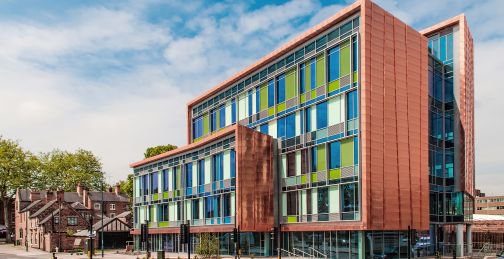One of the challenges to becoming a barrister can often relate to funding. Katie Goldstraw is a recent first class graduate of Derby Law School who is now studying the Bar Practice Course LLM at the University of Law, Manchester as a Headridge Scholar from the Honourable Society of Gray’s Inn. In this blog, Katie gives her insight into the scholarship process as well as some tips on how you too can be successful in achieving your goals.
Background
When you make the decision to begin your journey into the legal profession with an undergraduate LLB several doors begin to open, yet many questions are raised. In which area do I want to specialise? Geographically, where do I want to practice? What are my realistic prospects of success? How much money will it cost to qualify? What grades do I need to achieve?
My goal remains to practice in family and matrimonial law stemming from a personal childhood experience of proceedings although, initially the other questions remained unanswered. This continued to be the case throughout the first half of my LLB as I began to understand about the legal profession in practice and the different routes to qualification. When the end of my second year approached, I reached a crossroad. One question remained: solicitor or barrister? This decision was set to determine my preparations for postgraduate study. I began to reflect upon my advocacy grades, the work experiences placements that I had enjoyed the most, academic requirements and to which profession my skills were best suited. The Bar appealed to me because of the opportunity to undertake a sole family pupillage compared to different seats of legal practice during a training contract. Nonetheless, I was familiar that the cost of the Bar Practice Course (BPC) was a potential caveat given that even with assistance from Student Finance England I was left with money to find. Joining an Inn of court is a requirement for the BPC and fortunately they are renowned for providing invaluable financial and practical assistance to aspiring barristers.
Why Gray’s Inn?
I chose to apply to Gray’s Inn for my scholarship based upon their philosophy that talent should determine success at the Bar and not individual financial circumstances. Equally, irrespective of my financial circumstances I would not have been deterred from applying. Having undertaken relevant mini-pupillages and networking with current and senior members of the Bar I have learnt that when applying for pupillage, scholars appeal to chambers given thier prior acknowledgement from an Inn of court. Preceding my paper application, I also travelled to London to explore the Inn itself. Throughout my tour I was fascinated to walk around the estate and learn about the history of the Inn to more fully understand the Bar as a profession in context. I felt at home, welcomed by friendly faces and could picture myself a member throughout my forthcoming career.
The awards that Gray’s Inn offer are initially merit-based, and I felt that my academic background and experience to date best reflected their assessment criteria. Namely, scholars are selected based upon intellectual ability, motivation and prospects to succeed at the Bar, potential as an advocate, and personal qualities such as integrity and reliability. Gray’s Inn do not invite all applicants to interview which meant that not only did I need to genuinely impress the panel on paper but also if I was lucky enough to be invited to interview, I would be reassured about my likelihood of success.
The Application Process
Balancing such a significant paper application with final year LLB studies brings its own challenges but I prioritised these commitments to ensure that my application accurately reflected the said criteria. Given that applications close in November and Gray’s Inn do not interview until March, my advice to any aspiring applicants would be to utilise those four months and seek further mini-pupillages or advocacy experience because this will demonstrate commitment to such a competitive profession.
I was fortunate enough to be invited to interview and that long awaited email kickstarted my preparation. Reflecting upon conversations with previous scholars I was invited to familiarise myself with current affairs that the panel may ask me to debate with them, and really consider how I could make a strong and lasting impression in just 15-minutes. During my interview I chose, from two, the current hardships facing the English Legal System as a moot point because given its broad nature, I felt able to discuss my previous marshalling experience as confirmation of my opinions on the matter.
At Gray’s Inn each interview panel comprises of a range of legal professionals including barristers, members of the judiciary and academics to bring together different perspectives for each candidate. On my panel sat senior members of the Inn including a QC whom I’d previously connected with on LinkedIn. This eased my nerves slightly knowing her career path and her passion for moulding the next generation of advocates.
I was awarded a Headridge Scholarship with a minimum value of £5,000 prior to the means test. Following my success, I would advise any prospective applicant to research each of the four Inns of Court including their philosophies, to determine which best suits your background. During the interview just be yourself because the panel are not looking for ready-made barristers, they are looking for candidates with the potential and commitment to succeed at the Bar. Understand the significance of your paper application and take time to draft it. Ask professionals, previous scholars and even your family to proofread it because they will perhaps each have different suggestions for amendments. Finally, do not be afraid to make a mistake and present your genuine personality because the panel want to get to know you as an individual.
If you are thinking of applying for a scholarship, please do send me an email with any queries and I will be happy to assist in any way that I can.

